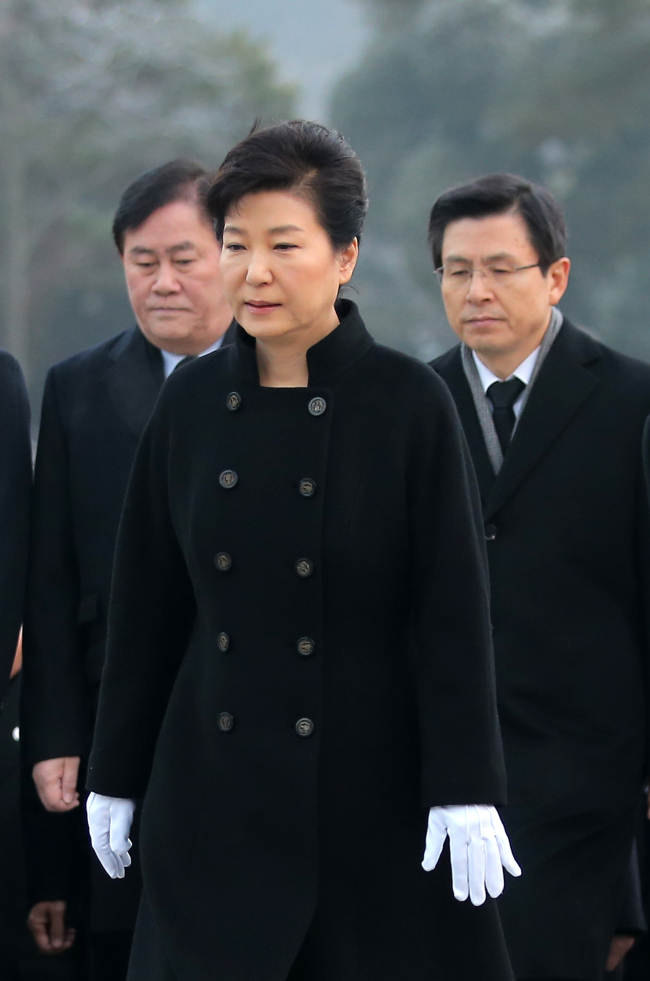The political clock is ticking for President Park Geun-hye.
With the next presidential race two years away, the incumbent state leader would normally have more time on her hands before entering her lame-duck period.
But in reality, Park is under pressure to come up with impressive achievements by April’s general election. If not, she might lose the spotlight to potential presidential candidates and their campaigns.
With the next presidential race two years away, the incumbent state leader would normally have more time on her hands before entering her lame-duck period.
But in reality, Park is under pressure to come up with impressive achievements by April’s general election. If not, she might lose the spotlight to potential presidential candidates and their campaigns.

The president’s advantage is that she has successfully allocated her close aides in key government posts while maintaining a sizable grip on the ruling party through a number of her bigwig associates. Also, her average approval rating has held firm in the 40 percent range despite several setbacks, reflecting an unwavering base of support.
Her weakness, however, is that very few of her key campaigns on social and economic reform have produced tangible results. Her economic reform initiatives, touted as the only option to save the economy, have been dragged into political debate, with a challenging outlook for their implementation.
The public backlash against her chief accomplishments last year, including the reinstatement of state-authored history textbooks and the recent deal with Japan on wartime sex slavery, are also boosting anti-Park sentiment.
In her New Year address, Park underscored that she would dedicate this year to revitalizing the economy by boosting domestic demand and creating jobs.
“I will achieve reforms in the labor, financial, education and public sectors and also complete the three-year economic innovation plan,” the president said.
The first chance to build momentum is the last plenary session of the National Assembly’s extraordinary session Friday, by which time the administration and the ruling party had been pushing to pass the related bills.
With negative external economic factors threatening to dent the economy, which is largely dependent on exports, Park emphasized the need for a contingency plan to prevent crisis.
In a Cabinet reshuffle in late December, Park nominated former Land Minister Rep. Yoo Il-ho of the ruling Saenuri Party as finance minister and vice prime minister. Former head of the Korea Institute of Public Finance, Yoo is an expert in tax and financial affairs, but this was not the only reason for his nomination.
He is also a close aide to Park, and therefore a predictable successor to Choi Kyung-hwan, who will soon step down from his current post and return to his parliamentary seat.
“For the sake of consistency, I will mostly uphold Choi’s key policies,” Yoo said, implying that he, too, will act as guardian and executor of the president’s economic reform plans.
But the task ahead of Park and her men appears more grueling than they would like, as Assembly strife means that passing the bills will not be straightforward.
Another hurdle for Park is the public’s growing resistance toward the government following the recent deal with Japan on the surviving former sex slaves. In a “final and irreversible” agreement, Japan agreed to pay 1 billion yen ($8.3 million) for Seoul to establish a fund for the victims, prompting angry opposition from victims and progressives, who said the agreement was made without their consent or consultation.
In a Realmeter survey, 50.8 percent of surveyed adults nationwide disapproved of the agreement, while 43.2 percent approved, with the response varying dramatically by age and region.
Meanwhile, Park’s approval rating has continued to remain steady, showing an unwavering level of support from her home city of Daegu and from elderly voters.
Surveys by local pollsters Gallup Korea and Realmeter respectively showed Park’s rating at 43 percent and 42.1 percent, as of the end of 2015.
On the diplomatic front, Park is expected to engage in bilateral exchanges with Japan and Russia this year. Both are countries to which Park is yet to make a summit visit. She held talks with Russian counterpart Vladimir Putin in November 2013, and with Japan’s Prime Minister Shinzo Abe last November.
Park had been withholding her visit to Moscow over the Ukraine conflict. News reports have predicted that Park may be participating in the 2nd Eastern Economic Forum to be held in September in Vladivostok.
There is some speculation that Park will visit Tokyo around May, when Japan is hosting the G7 summit.
By Bae Hyun-jung (tellme@heraldcorp.com)
-
Articles by Korea Herald






![[KH Explains] How should Korea adjust its trade defenses against Chinese EVs?](http://res.heraldm.com/phpwas/restmb_idxmake.php?idx=644&simg=/content/image/2024/04/15/20240415050562_0.jpg&u=20240415144419)












![[Today’s K-pop] Stray Kids to return soon: report](http://res.heraldm.com/phpwas/restmb_idxmake.php?idx=642&simg=/content/image/2024/04/16/20240416050713_0.jpg&u=)